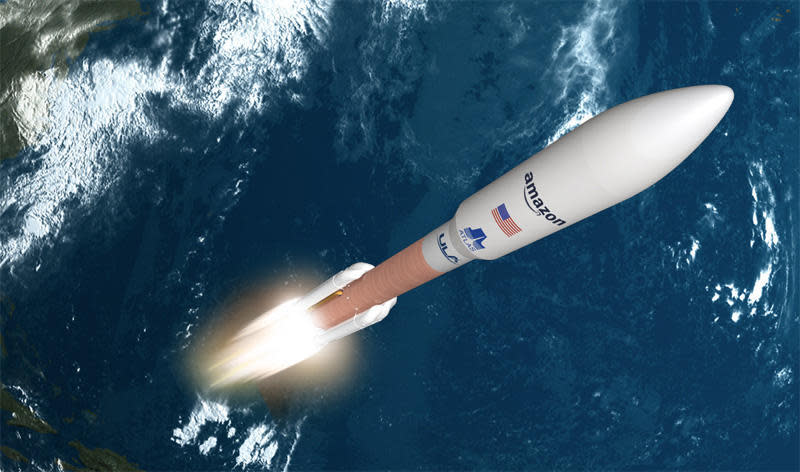Amazon buying Atlas 5 rockets to launch its internet satellites
Amazon plans to buy nine powerful Atlas 5 rockets from United Launch Alliance to boost an initial wave of the company's planned Kuiper internet satellites into orbit. The satellites will be part of a planned constellation of 3,236 relay stations that will compete with OneWeb and SpaceX's fast-growing Starlink system.
"We're determined to make affordable broadband a reality for customers and communities around the world," Amazon founder Jeff Bezos said in a statement. "ULA is a fantastic partner that's successfully launched dozens of missions for commercial and government customers, and we're grateful for their support of Kuiper."
Bezos also owns Blue Origin, a rapidly growing company building suborbital rockets and spacecraft to carry citizens, researchers and experiments on sub-orbital flights to the edge of space, along with more powerful New Glenn rockets that will carry commercial satellites to orbit.

The company has built a sprawling rocket manufacturing and test facility just outside the Kennedy Space Center and is building a state-of-the-art launch pad for New Glenn boosters at the nearby Cape Canaveral Space Force Station. Blue Origin presumably will compete for downstream Kuiper launch contracts.
In the meantime, Monday's announcement did not reveal how much Amazon will pay for the Atlas 5 launches, but the rocket's base price starts at around $109 million.
"We've designed our satellites and dispenser system to accommodate multiple launch vehicles, this gives us the flexibility to use many different rockets and providers to launch our satellite system," Rajeev Badyal, VP of technology for Project Kuiper, said in a ULA statement. "Atlas V is a capable, reliable rocket, and we're proud to be working with ULA to support these important first launches."
Providing high-speed internet service through satellites in low-Earth orbits is a hotly contested field in the emerging commercial space environment. With enough satellites, Earth can be blanketed in uninterrupted broadband signals, providing relatively high-speed internet to customers anywhere in the world.
SpaceX, under the direction of Elon Musk, has jumped out to an early lead, launching 1,445 small Starlink satellites with 24 launches to date of its Falcon 9 rocket. Limited beta-level service already is available to customers in North American and Europe with continuous commercial service expected before the end of the year.
The company has regulatory approval to launch more than 12,000 Starlinks.
OneWeb, a partnership between the United Kingdom and Bharti Global, also plans to offer space-based broadband service and has launched 146 satellites to date in a planned constellation of more than 650. Operating in higher orbits, fewer OneWeb satellites will be required to provide global service.
Amazon has committed more than $10 billion to develop its Kuiper system, "which aims to make high-speed, low-latency broadband more affordable and accessible for unserved and underserved communities around the world," the ULA statement said.
In an application with the Federal Communications Commission, Amazon said its satellites will operate in multiple orbital planes at altitudes between 320 and 390 miles, according to Bloomberg News. Twelve ground stations will route signals to and from the satellites, operating in multiple orbital planes.
SpaceX typically launches 60 Starlink satellites with every launch. Amazon has not yet provided details on how many Kuiper satellites can be accommodated atop an Atlas 5 or when flights will begin from ULA's launch complex 41 at the Cape Canaveral Space Force Station.
The growing competition in the space-based internet industry has raised alarm in some quarters about the increased possibility of close encounters, if not outright collisions creating clouds of debris that could threaten other spacecraft. And professional astronomers are worried the satellite swarms will interfere with sensitive observations by the world's largest telescopes.
SpaceX is making efforts to reduce the reflectivity of its satellites, but the long-term impact of the planned fleets is not yet known.
CDC predicts spike in COVID-19 cases this month, then a decline
"See Us Unite" campaign looks to address hate
Trucker shortage could make it harder to fill your tank this summer

